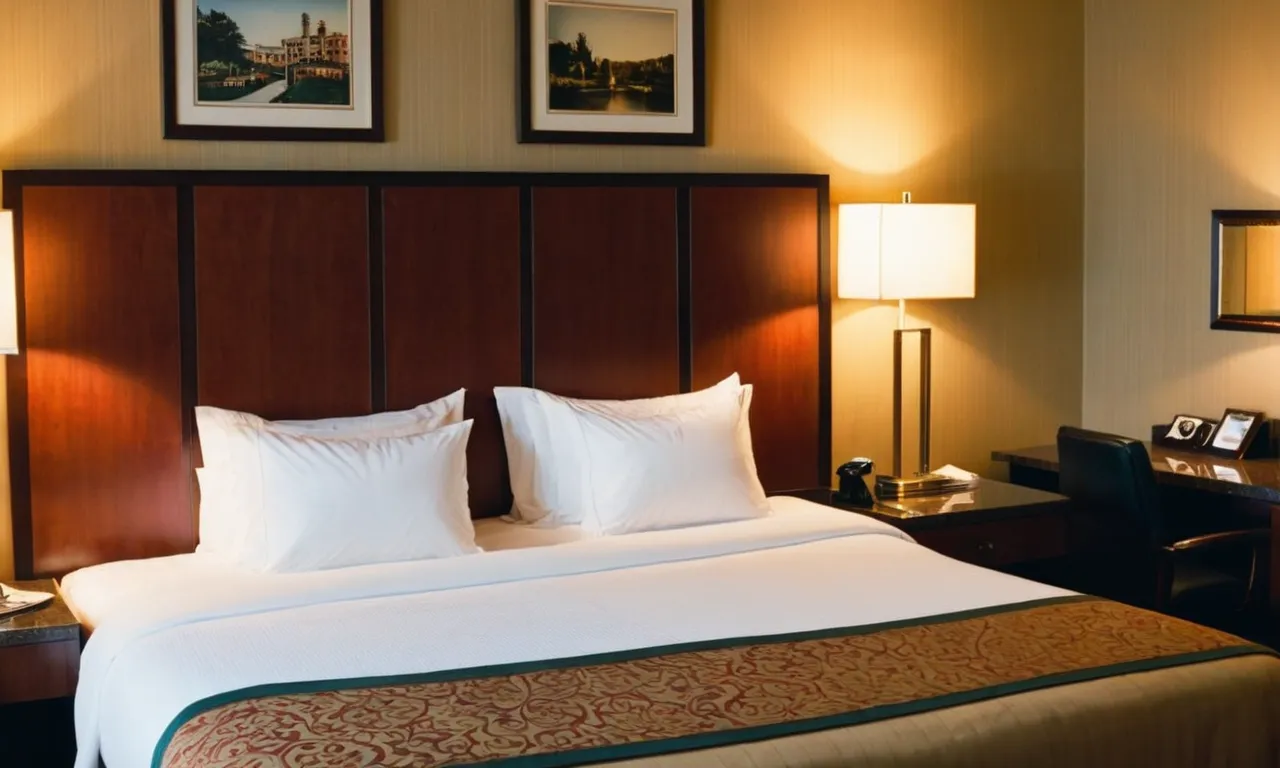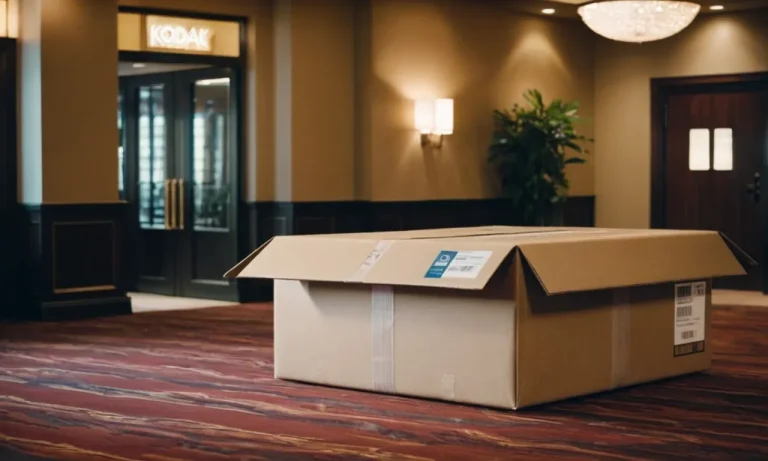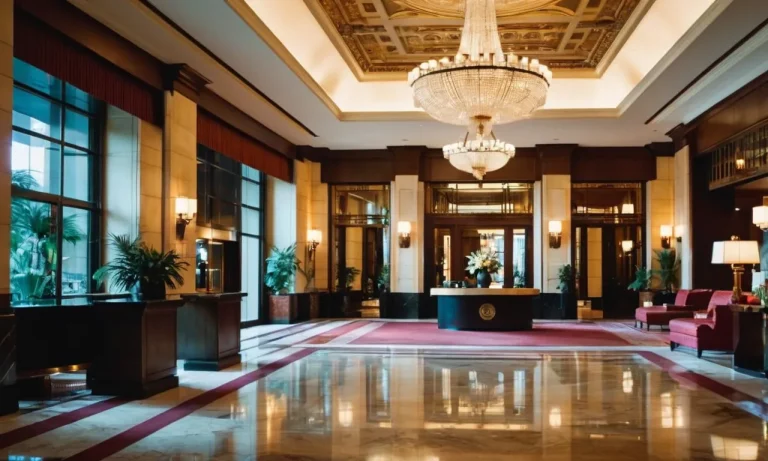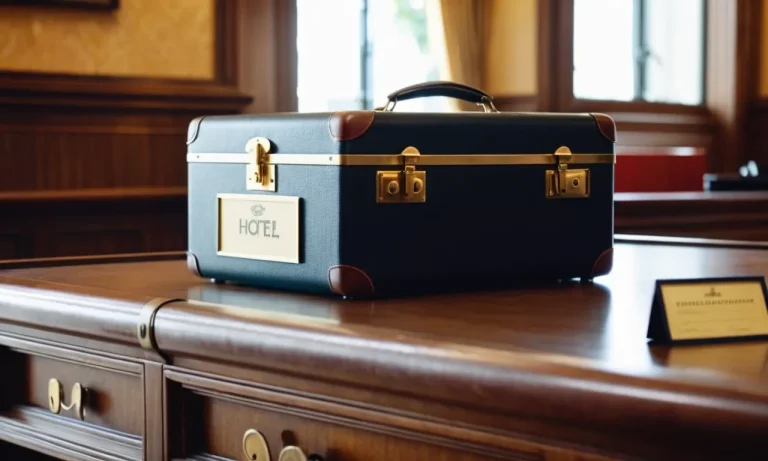Can A Hotel Charge You For Noise Complaints? A Comprehensive Guide
Have you ever found yourself in a situation where your hotel stay was disrupted by noise complaints? Whether it’s a lively party in the room next door or a group of rowdy guests in the hallway, noise disturbances can quickly turn a relaxing vacation into a frustrating ordeal.
If you’re short on time, here’s a quick answer to your question: Yes, hotels can charge you for noise complaints, but the specific policies and fees vary from one establishment to another.
In this comprehensive article, we’ll delve into the details of hotel noise complaint policies, exploring the circumstances under which you may be charged, the potential fees involved, and the steps you can take to avoid such situations.
We’ll also discuss your rights as a guest and provide tips for handling noise complaints effectively.
Understanding Hotel Noise Complaint Policies
When booking a hotel stay, guests expect a peaceful and relaxing environment. However, noise disturbances can quickly turn a dream vacation into a nightmare. To maintain a harmonious atmosphere, hotels have implemented noise complaint policies to address such issues.
These policies aim to strike a balance between respecting guests’ comfort and ensuring a positive experience for all.
Common Noise Complaint Scenarios
- Loud music or television from neighboring rooms
- Rambunctious behavior in hallways or common areas
- Late-night parties or gatherings
- Slamming doors or excessive foot traffic
- Noisy renovations or maintenance work
Hotel Policies and Guest Agreements
Most hotels outline their noise policies in the guest agreement or terms and conditions, which guests typically agree to upon check-in. These policies may include quiet hours, acceptable noise levels, and procedures for reporting disturbances.
For example, according to Marriott’s hotel policies, guests are expected to “conduct themselves in a manner that does not disturb other guests or hotel associates.”
Hotels often have dedicated staff or security personnel to respond to noise complaints promptly. They may issue warnings, request guests to lower the volume, or, in extreme cases, ask disruptive guests to leave the premises.
It’s crucial for guests to familiarize themselves with these policies to avoid potential consequences or fees.
Potential Consequences and Fees
If guests repeatedly violate noise policies despite warnings, hotels may impose fines or charges. These penalties can vary based on the severity of the disturbance and the hotel’s specific policies. According to a survey by Travel and Leisure, around 27% of hotels charge fees ranging from $50 to $500 for noise complaints.
In extreme cases, hotels may even involve local authorities or law enforcement to address excessive noise or disruptive behavior. Guests who cause significant disturbances or damage to property may face additional legal consequences or charges. It’s always advisable to respect fellow guests and hotel staff by keeping noise levels reasonable and following the established policies.
😊
By understanding hotel noise complaint policies, guests can enjoy their stay without disrupting others and avoid potentially costly penalties. After all, a little consideration goes a long way in creating a pleasant and enjoyable experience for everyone involved. 👏
Factors Influencing Noise Complaint Charges
When it comes to noise complaints at hotels, several factors can influence whether you’ll be slapped with a fine or not. The severity and frequency of the disturbances, the time of day and location, as well as the hotel’s rating and reputation, all play a crucial role in determining the consequences.
Let’s delve deeper into each of these elements.
Severity and Frequency of Noise Disturbances
The severity of the noise complaint is a major consideration. A loud conversation or a TV on high volume might not warrant a charge, but a full-blown party with blaring music and rowdy guests could land you in hot water.
According to a survey by TripAdvisor, 62% of hotel guests cited noise as a major source of dissatisfaction during their stay. Repeated violations, even if minor, can also lead to fines or even eviction from the premises. After all, hotels strive to maintain a peaceful environment for all guests.
Time of Day and Location
The time of day when the noise disturbance occurs can be a significant factor. Late-night noise complaints are typically viewed more seriously than those during daytime hours. A study by the American Hotel & Lodging Association revealed that 47% of noise complaints occur between 10 PM and 6 AM, when most guests are trying to sleep.
Additionally, the location of the noise source matters. Disturbances near quiet zones or areas designated for families with children may result in harsher consequences.
Hotel Rating and Reputation
The hotel’s rating and reputation can also influence how noise complaints are handled. Luxury or high-end hotels tend to have stricter policies and higher fines for noise violations to maintain their upscale image and cater to guests seeking a tranquil experience.
On the other hand, budget hotels or those catering to a more lively crowd may be more lenient, as long as the noise doesn’t cross certain thresholds. According to Forbes, a staggering 89% of luxury hotel guests cited noise as a major factor in their overall satisfaction.
It’s worth noting that while hotels have the right to charge for noise complaints, the fees and policies can vary widely. Some hotels may issue a warning first, while others may impose immediate fines ranging from $50 to $500 or even eviction, depending on the circumstances.
To avoid any unpleasant surprises during your stay, it’s always a good idea to familiarize yourself with the hotel’s noise policies beforehand. After all, a little consideration for your fellow guests can go a long way in ensuring a peaceful and enjoyable stay for everyone. 😊
Handling Noise Complaints: Best Practices
Communicating with Hotel Staff
Effective communication with hotel staff is crucial when dealing with noise complaints. As soon as you encounter disruptive noise, politely inform the front desk or a manager. Many reputable hotels, such as those listed on TripAdvisor, have protocols in place to address noise issues promptly.
However, according to a recent survey by Hotel Management, 35% of guests feel that their noise complaints are not taken seriously enough. To ensure your concerns are addressed, remain calm and provide specific details about the source and duration of the noise. 😊
Resolving Conflicts with Other Guests
In some cases, noise complaints may involve conflicts with other guests. While it’s tempting to confront them directly, this approach can often escalate the situation. Instead, consider the following steps:
- Notify hotel staff and allow them to mediate the issue professionally.
- If the noise persists, request a room change to a quieter area. According to Hotels.com, 68% of hotels are willing to accommodate such requests if availability permits.
- As a last resort, you may need to involve local authorities if the hotel fails to address the disturbance adequately. However, this should be a last resort, as it can lead to unpleasant situations for all parties involved.
Seeking Compensation or Refunds
In cases where noise issues significantly disrupt your stay, you may be entitled to compensation or a refund. Here’s what you should know:
- Most hotels have policies in place to offer discounts, complimentary nights, or refunds for unresolved noise complaints that impact the quality of your stay. Don’t be afraid to ask about these options politely.
- If the hotel is unwilling to compensate you fairly, consider filing a complaint with the relevant consumer protection agency or travel organization. For example, the Better Business Bureau can assist in resolving disputes with hotels.
- As a last resort, you may have legal grounds to seek compensation through small claims court if the noise disturbance was severe and the hotel failed to address it appropriately. However, this should be a last resort, as legal proceedings can be time-consuming and costly.
Remember, communication, patience, and a willingness to compromise can go a long way in resolving noise complaints effectively. By following these best practices, you can ensure a more enjoyable and peaceful hotel stay. 👏
Guest Rights and Legal Considerations
Local Noise Ordinances and Laws
When it comes to noise complaints in hotels, it’s crucial to understand the local noise ordinances and laws that govern the area. These regulations vary from city to city and state to state, but they typically outline acceptable noise levels and quiet hours.
Guests have the right to a peaceful and undisturbed stay, and hotels are obligated to enforce these ordinances to maintain a comfortable environment for all guests. According to a study by the American Hotel & Lodging Association, noise complaints are among the top three guest grievances, highlighting the importance of addressing this issue effectively.
Discrimination and Harassment Policies
Hotels have a legal and ethical responsibility to protect their guests from discrimination and harassment. If a guest feels they are being unfairly targeted or treated differently due to their race, religion, gender, or any other protected characteristic, they have the right to escalate the issue and seek appropriate resolution.
The Americans with Disabilities Act (ADA) also prohibits discrimination against individuals with disabilities, including in places of public accommodation like hotels. Guests with disabilities may have specific needs or accommodations that should be respected and addressed appropriately by hotel staff.
Dispute Resolution and Escalation Procedures
In the event of a noise complaint or any other dispute, hotels should have clear procedures in place for resolution and escalation. This typically involves first attempting to resolve the issue at the front desk or with on-site management.
If the matter cannot be resolved satisfactorily, guests have the right to escalate the issue to higher levels of management or even seek legal recourse if necessary. Many hotels are part of larger chains or franchises, and guests can often escalate complaints to the corporate level if needed.
Additionally, online review platforms like TripAdvisor and Yelp provide a platform for guests to share their experiences and hold hotels accountable for their actions.
It’s worth noting that while hotels have the right to charge guests for excessive noise or disruptive behavior that violates their policies, they must follow established protocols and avoid discriminatory practices.
Clear communication, fair treatment, and a commitment to resolving disputes amicably are essential for maintaining positive guest relations and upholding legal and ethical standards.
Conclusion
Noise complaints can quickly turn a relaxing hotel stay into a stressful and costly experience. By understanding hotel policies, being mindful of your actions, and communicating effectively with staff and other guests, you can minimize the risk of incurring noise complaint charges.
Remember, hotels have the right to enforce their policies and maintain a peaceful environment for all guests. However, as a guest, you also have rights and should be treated fairly and respectfully. If you find yourself in a situation where noise complaints are escalating, don’t hesitate to seek assistance from hotel management or explore legal options if necessary.
Ultimately, being a considerate and responsible guest is the best way to avoid noise complaint charges and ensure a pleasant and memorable hotel experience for everyone involved.







